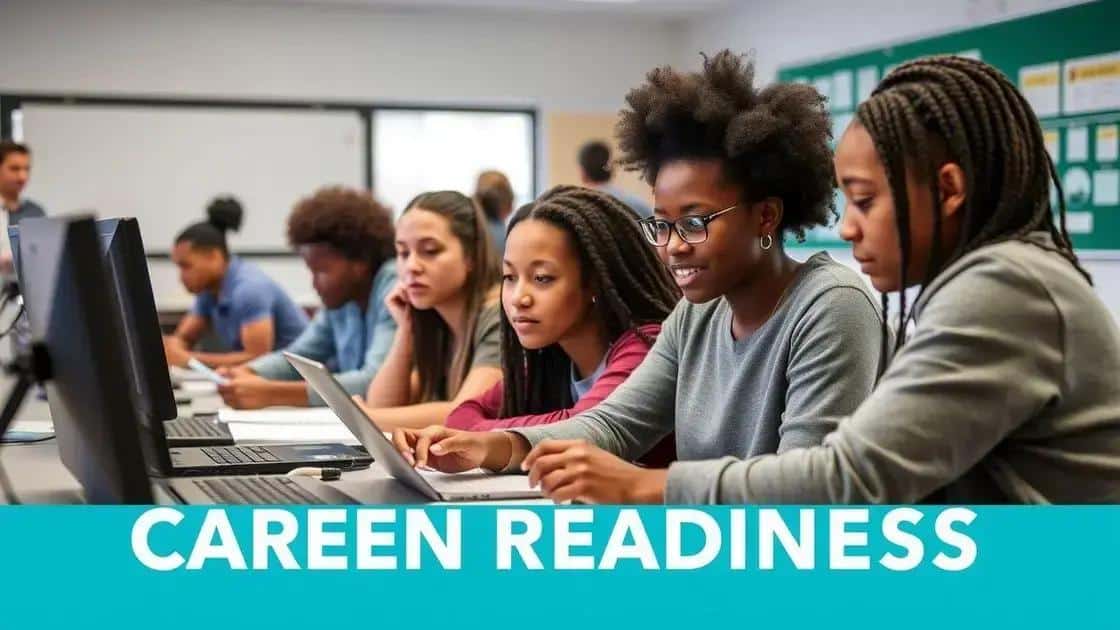Career readiness programs trends shaping the future

Career readiness programs trends highlight the increasing demand for soft skills, technological proficiency, and real-world experiences essential for students to meet employer expectations and succeed in the competitive job market.
Career readiness programs trends are evolving rapidly, adapting to the changing demands of the job market. Have you ever wondered how these shifts can affect your career path? Let’s dive into what’s happening and how you can benefit from it.
Understanding career readiness programs
Understanding career readiness programs is crucial in today’s fast-paced job market. These programs are designed to equip students with the necessary skills and experiences to successfully transition from school to work.
What Are Career Readiness Programs?
These programs focus on developing the essential skills that employers seek. They often involve hands-on training, workshops, and real-world experiences.
Key Components of Effective Programs
An effective career readiness program typically includes several key components:
- Skill Development: Training students in both soft and hard skills.
- Internships: Providing opportunities for practical experience in a professional environment.
- Networking: Connecting students with industry professionals.
- Mentorship: Offering guidance from experienced mentors in their field.
By engaging in these components, students build confidence and gain insights into their chosen industries. Employers appreciate candidates who demonstrate readiness and adaptability. These programs act as a bridge, linking education and employment.
Furthermore, many programs adapt to the changing landscape of the workforce, integrating modern technologies and trends. This adaptability ensures students learn relevant skills that align with current job demands.
In summary, understanding career readiness programs allows students to better prepare for the future, equipping them with tools to succeed in their careers.
Key trends influencing career readiness

Key trends influencing career readiness are shaping how students prepare to enter the workforce. Understanding these trends can give students a competitive edge as they embark on their career journeys.
Emphasis on Soft Skills
Employers are increasingly looking for candidates who possess strong soft skills. These include communication, teamwork, and problem-solving abilities. Many career readiness programs now focus on developing these skills alongside technical knowledge.
Integration of Technology
In today’s digital world, proficiency in technology is essential. Career readiness programs are adapting by incorporating digital tools and training. This ensures that students are familiar with virtual collaboration and modern job platform tools.
- Online learning: Many programs now offer virtual courses to reach a broader audience.
- Simulated experiences: Mock interviews and online assessments prepare students for real-world scenarios.
- Digital portfolios: Students are encouraged to create online portfolios showcasing their skills and accomplishments.
As industries evolve, career readiness must adapt. The growing importance of sustainability initiatives is another significant factor. More employers are seeking candidates who can address environmental challenges and demonstrate a commitment to sustainability.
Another trend is the focus on lifelong learning. With rapid technological advancements, ongoing education is crucial. Many professionals are now participating in continuous training to stay updated in their fields. Career readiness programs are addressing this need by providing resources for ongoing development.
These key trends are guiding how students are prepared for the workforce, ensuring they meet the current demands of employers.
Impact of technology on readiness programs
The impact of technology on readiness programs is significant in today’s educational landscape. As advancements continue, these programs evolve to better prepare students for the workforce.
Enhancing Learning Experiences
Technology offers innovative tools that enhance learning experiences. Virtual classrooms allow students to access resources anywhere, providing flexibility and convenience. This increased accessibility helps to engage students in ways that were not possible before.
Real-World Simulations
Many programs now incorporate virtual reality and online simulations. These technologies give students realistic experiences that mimic workplace situations. Through these immersive encounters, students develop important skills while learning how to navigate complex scenarios.
- Interactive platforms: Students can participate in engaging projects that reflect real-world challenges.
- Online assessments: Technology allows for quick feedback and tailored learning paths.
- Collaboration tools: Platforms like video conferencing enable teamwork even when students are remote.
Moreover, data analytics help educational institutions track student progress more precisely. By analyzing performance metrics, educators can adjust programs to better serve students’ needs. This data-driven approach creates a more personalized learning environment.
As technology shapes the future, readiness programs must embrace these changes to remain relevant. It opens doors to innovative teaching methods and improves student outcomes. Ultimately, leveraging technology benefits not only students but also employers looking for qualified candidates ready to excel in the modern workplace.
How employers perceive career preparedness

How employers perceive career preparedness directly influences hiring decisions. Companies seek candidates who not only have the right qualifications but also demonstrate readiness for the workplace.
Key Skills and Attributes
Employers identify several essential skills as indicators of a well-prepared candidate. These skills often include:
- Communication: The ability to convey ideas clearly and effectively.
- Problem-solving: Skills to identify issues and develop solutions quickly.
- Teamwork: The capacity to work collaboratively with others.
- Adaptability: Being flexible and open to change in a dynamic work environment.
Additionally, employers appreciate candidates who are proactive. A strong initiative shows that a candidate is motivated and ready to take on challenges. Many companies look for apprenticeships or relevant work experiences in resumes, as they reflect real-world applications of learned skills.
Impact of Career Readiness Programs
The perception of career preparedness is also shaped by the effectiveness of career readiness programs. When these programs align well with industry needs, employers report higher confidence in hiring graduates. Programs that emphasize practical skills and real-world experience help students stand out.
Moreover, networking opportunities offered through these programs can facilitate connections with potential employers. Even informal introductions can lead to job opportunities, making it vital for students to leverage these interactions.
Employers increasingly utilize assessments during the hiring process to gauge preparedness. Skills assessments, situational judgment tests, and structured interviews help them understand how candidates would perform in actual job scenarios.
In summary, understanding how employers perceive career preparedness is crucial for students. By focusing on the right skills and engaging in impactful programs, they can increase their chances of success in the competitive job market.
In conclusion, understanding how employers perceive career preparedness is crucial for students entering the job market. By focusing on essential skills like communication, teamwork, and adaptability, students can enhance their employability. Additionally, engaging in effective career readiness programs provides valuable experiences that align with employer expectations. Students who take initiative and seek opportunities to develop their skills are more likely to succeed. The focus on technological skills and ongoing learning will continue to shape the workplace, making it important for students to stay informed and prepared for future challenges.
FAQ – Questions about Career Readiness Programs and Employer Expectations
What skills do employers look for in candidates?
Employers often seek communication, teamwork, problem-solving abilities, and adaptability in candidates.
How can career readiness programs help students?
These programs provide students with real-world experiences and skills that align with employer expectations, increasing their employability.
Why is lifelong learning important for job seekers?
Lifelong learning helps individuals stay relevant and competitive in a fast-changing job market by continuously updating their skills.
What role does technology play in career readiness?
Technology enhances learning experiences and prepares students for modern workplaces by providing tools and simulations that reflect real-world scenarios.





